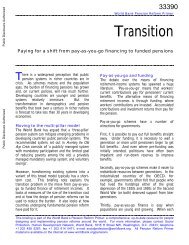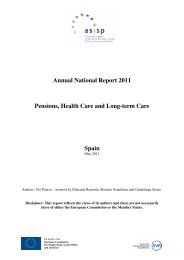Financial Sector Development in Africa: Opportunities ... - World Bank
Financial Sector Development in Africa: Opportunities ... - World Bank
Financial Sector Development in Africa: Opportunities ... - World Bank
You also want an ePaper? Increase the reach of your titles
YUMPU automatically turns print PDFs into web optimized ePapers that Google loves.
162 Fuchs, Losse-Mueller, and Witte<br />
capital adequacy ratio of 8 percent, but supervisors were encouraged to<br />
set higher ratios, as was the case <strong>in</strong> most <strong>Africa</strong>n jurisdictions.<br />
In 2004, the Basel II reforms <strong>in</strong>troduced additional risk-sensitive<br />
options <strong>in</strong> the calculation of capital requirements based on the greater<br />
use of risk assessments provided by banks’ <strong>in</strong>ternal credit and market risk<br />
systems. Most important, the <strong>in</strong>tention of the reforms under Basel II—to<br />
allow banks to use capital more efficiently and broaden the framework’s<br />
scope by <strong>in</strong>clud<strong>in</strong>g operational risks—resulted <strong>in</strong> lower capital requirements<br />
for most credit risk classes, which are the predom<strong>in</strong>ant form of risk<br />
for <strong>Africa</strong>n banks. Aga<strong>in</strong>st the background of the strategic development<br />
dilemma of the need to ma<strong>in</strong>ta<strong>in</strong> high capital as a stability anchor versus<br />
the need to leverage capital to mobilize fund<strong>in</strong>g resources, it is important<br />
to note that Basel II did not lower capital requirements per se, but <strong>in</strong>stead<br />
<strong>in</strong>creased the risk sensitivity of capital requirements. This provided for a<br />
more efficient use of capital, assum<strong>in</strong>g, of course, that banks have the<br />
necessary capacity to manage risk accord<strong>in</strong>g to the more sophisticated<br />
approaches of Basel II and also that supervisors are able to monitor banks’<br />
risk management capacity.<br />
Accord<strong>in</strong>g to the Results of the Fifth Quantitative Impact Study (BCBS<br />
2006), banks that used the new option of the advanced <strong>in</strong>ternal rat<strong>in</strong>gsbased<br />
approach (IRB) reduced their m<strong>in</strong>imum required capital by up to<br />
30 percent more than banks us<strong>in</strong>g Basel I. IRB-based capital reductions<br />
were especially strong for retail mortgages (82 percent), small and<br />
medium retail loans (72 percent), and corporate loans (27 percent). Basel<br />
II predicates these reduced capital requirements on a significant <strong>in</strong>crease<br />
<strong>in</strong> supervisory requirements—and therefore demands on supervisory<br />
capacity—<strong>in</strong>clud<strong>in</strong>g the need for supervisors to assess <strong>in</strong>dividual bank risk<br />
management systems. It requires supervisors to exercise considerable<br />
judgment <strong>in</strong> review<strong>in</strong>g and evaluat<strong>in</strong>g a bank’s <strong>in</strong>ternal risk management<br />
practices, its exposure to risks, its fund<strong>in</strong>g structure, and its overall risk<br />
profile.<br />
Figure 5.4 illustrates the relation between overall regulatory capacity<br />
and capital adequacy under the three different frameworks. Today most<br />
<strong>Africa</strong>n countries operate under Basel I, which—<strong>in</strong> comparison with the<br />
more recent revisions—is characterized by higher capital and less-def<strong>in</strong>ed<br />
demands on supervisory capacity. Most <strong>Africa</strong>n frameworks are characterized<br />
by an even higher reliance on capital and lower levels of supervisory<br />
capacity than implied by the full observance of the BCPs, which complemented<br />
Basel I. A potential move to Basel II is a formidable challenge for<br />
any regulator. It requires a significant step-change <strong>in</strong> supervisory capacity,







